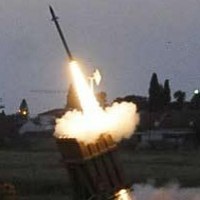Wed, June 02, 2010 | NYDailynews | By Alan Dershowitz
Israel obeyed international law: Legally, the Gaza flotilla conflict is an open-and-shut case
Some excerpts:
Although the wisdom of Israel’s actions in stopping the Gaza flotilla is open to question, the legality of its actions is not. What Israel did was entirely consistent with both international and domestic law.
Recall that when Israel ended its occupation of Gaza, it did not impose a blockade. Indeed, it left behind agricultural facilities in the hope that the newly liberated Gaza Strip would become a peaceful and productive area.
Instead, Hamas seized control over Gaza and engaged in acts of warfare against Israel… This was not only an act of warfare, it was a war crime. Israel responded to the rockets by declaring a blockade, the purpose of which was to assure that no rockets or other material that could be used for making war against Israeli civilians were permitted into Gaza.
Israel allowed humanitarian aid through its checkpoints. Egypt as well participated in the blockade. There was never a humanitarian crisis in Gaza…
The legality of blockades as a response to acts of war is not subject to serious doubt. When the United States blockaded Cuba during the missile crisis, the State Department issued an opinion declaring the blockade to be lawful. This despite the fact that Cuba had not engaged in any act of belligerence against the United States. Other nations have similarly enforced naval blockades to assure their own security.
The second issue is whether it is lawful to enforce a legal blockade in international waters. Again, law and practice are clear. If there is no doubt that the offending ships have made a firm determination to break the blockade, then the blockade may be enforced before the offending ships cross the line into domestic waters. Again the United States and other Western countries have frequently boarded ships at high sea in order to assure their security.
The act of breaking a military siege is itself a military act. And let there be no mistake about the purpose of this flotilla; it was decidedly not to provide humanitarian aid to the residents of Gaza, but rather to break the entirely lawful Israeli military blockade. The proof lies in the fact that both Israel and Egypt offered to have all the food, medicine and other humanitarian goods sent to Gaza, if the boats agreed to land in an Israeli or Egyptian port. That humanitarian offer was soundly rejected by the leaders of the flotilla…
Finally, we come to the issue of the right of self-defense engaged in by Israeli soldiers who were attacked by activists on the boat… under ordinary civilian rules of self-defense, every Israeli soldier had the right to protect himself and his colleagues from attack by knife- and pipe-wielding assailants… Recall that Israel’s rules of engagement required its soldiers to fire only paintballs unless their lives were in danger… the case has simply not been made that Israel violated international law.
You can download here a copy of “The Helsinki Principles on the Law of Maritime Neutrality”.
The relevant clauses in the Helsinki Principles read as follows:
5.1.1 Neutral ships in belligerent ports
A neutral ship in a belligerent port enjoys the same protection against attacks as civilian objects in land warfare. Neutral ships exempt from attack, e.g. hospital ships, retain that exemption in belligerent ports. Neutral warships in belligerent ports retain their right of self-defence.
5.1.2 Protection against attacks
(2) Merchant ships flying the flag of a neutral State may not be attacked except as provided in paragraphs 3 and 4.
(3) Merchant ships flying the flag of a neutral State may be attacked if they are believed on reasonable grounds to be carrying contraband or breaching a blockade, and after prior warning they intentionally and clearly refuse to stop, or intentionally and clearly resist visit, search, capture or diversion.
(4) Merchant ships flying the flag of a neutral State may be attacked if they:
(a) engage in belligerent acts on behalf of the enemy;
(b) act as auxiliaries to the enemy’s armed forces;
(c) are incorporated into or assist the enemy’s intelligence system;
(d) sail under convoy of enemy warships or military aircraft; or
(e) otherwise make an effective contribution to the enemy’s military action, e.g., by carrying military materials, and it is not feasible for the attacking forces to first place passengers and crew in a place of safety. Unless circumstances do not permit, they are to be given a warning, so that they can re-route, off-load, or take other precautions.
(5) Merchant ships flying the flag of a neutral State and carrying only civilian passengers, e.g., liners, may not be attacked but must be diverted to an appropriate port to complete capture, unless they are incorporated into or assist the enemy’s intelligence system.
(6) Ships flying the flag of a neutral State and entitled to exemption from capture, e.g., hospital ships, may not be attacked if they are innocently employed in their normal role, do not commit acts harmful to the enemy, immediately submit to identification and inspection when required, and do not intentionally hamper the movement of combatants and obey orders to stop or to move out of the way when required.
5.2.1 Visit and search
As an exception to Principle 5.1.2. paragraph 1 and in accordance with Principle 1.3 (2nd sentence), belligerent warships have a right to visit and search vis-à-vis neutral commercial ships in order to ascertain the character and destination of their cargo. If a ship tries to evade this control or offers resistance, measures of coercion necessary to exercise this right are permissible. This includes the right to divert a ship where visit and search at the place where the ship is encountered are not practical.
5.2.10 Blockade
Blockade, i.e. the interdiction of all or certain maritime traffic coming from or going to a port or coast of a belligerent, is a legitimate method of naval warfare. In order to be valid, the blockade must be declared, notified to belligerent and neutral States, effective and applied impartially to ships of all States. A blockade may not bar access to neutral ports or coasts. Neutral vessels believed on reasonable and probable grounds to be breaching a blockade may be stopped and captured. If they, after prior warning, clearly resist capture, they may be attacked.



 RSS
RSS











Israel Obeyed International Law: The Helsinki Principles #israel #gaza #flotilla #blockade #jcot http://j.mp/9ARgZ1
RT @CrethiPlethi: Israel Obeyed International Law: The Helsinki Principles #israel #gaza #flotilla #blockade #jcot http://j.mp/9ARgZ1
RT @Jbroks86: RT @CrethiPlethi Israel Obeyed International Law: The Helsinki Principles #israel #gaza #flotilla #blockade http://j.mp/9ARgZ1
[…] This post was mentioned on Twitter by heather and Sarah Leah , Crethi Plethi. Crethi Plethi said: Israel Obeyed International Law: The Helsinki Principles #israel #gaza #flotilla #blockade #jcot http://j.mp/9ARgZ1 […]
RT @CrethiPlethi: Israel Obeyed International Law: The Helsinki Principles #israel #gaza #flotilla #blockade #jcot http://j.mp/9ARgZ1
[…] Middle East Affairs Information Center | Analysis, Downloads and In depth information on Middle East Affairs, Israel and Islam — Topsy.com: This… Jo Ellen Davey Cohen: RT @CrethiPlethi: The Media’s Skewed Gaza Flotilla Coverage … See more here: Israel Obeyed International Law | Middle East Affairs Information … […]
(e) otherwise make an effective contribution to the enemy's military action, e.g., by car… http://reduce.li/neh5ci #enemy
Helsinki applies to this attack if and only if a legal state of war exists between Israel and Hamas. That’s fine if Israel wants to take that position. But it means that captured Hamas fighters get Geneva protections. Israel can’t decide that a legal state of war exists when it is convenient, and that one does not exist when it is inconvenient.
@Steve
Yes, you have a point there. If Israel is in an IAC with Hamas (international armed conflict), than captured Hamas fighters are considered POW’s under the Geneva Convention. At the same time, the naval blockade of Gaza would be legitimate.
If it’s not an IAC (and this is not clear to me), but I believe Israel views itself in an armed conflict with Hamas, than legal experts have something to debate about. I’m not an expert on maritime law, but I know that some legal experts say that the blockade is legal and others say it’s not.
What about Hamas fighters if it’s not an IAC?
Hamas did not establish a legal state in Gaza, in fact officially Gaza doesn’t have an administration and a prime minister/president. Hamas ideology wants to create a Caliphate in all of Palestine and beyond (one muslim ruler over all muslim land). That’s why Hamas didn’t declare a Gazan state.
Hamas is therefore at this moment not a legal army (of a state), but a militia. Their (“unlawful”) combatants are terrorists and mercenaries and not a regular army. Therefore, they have (limited) rights based on the Geneva Convention. If there is any doubt about whether a detained alleged combatant is a “lawful combatant” then the combatant must be held as a prisoner of war until his or her status has been determined by “a competent tribunal”. If that tribunal rules that a combatant is an “unlawful combatant” then the person’s status changes to that of a civilian which may give them some rights under the Fourth Geneva Convention.
What about the mercenaries and foreign volunteers in Hamas’ militia units?
“Under Article 47 of Protocol I (Additional to the Geneva Conventions of 12 August 1949, and relating to the Protection of Victims of International Armed Conflicts) it is stated in the first sentence “A mercenary shall not have the right to be a combatant or a prisoner of war.”
On 4 December 1989 the United Nations passed resolution 44/34 the International Convention against the Recruitment, Use, Financing and Training of Mercenaries. It entered into force on 20 October 2001 and is usually known as the UN Mercenary Convention. Article 2 makes it an offence to employ a mercenary and Article 3.1 states that “A mercenary, as defined in article 1 of the present Convention, who participates directly in hostilities or in a concerted act of violence, as the case may be, commits an offence for the purposes of the Convention.”
If Hamas fighters want the protection of the Geneva Convention, than they should also act as soldiers under the Geneva Convention, meaning they cannot longer fight in civilian clothing or use ambulances as transport for their fighters and weapons, as they did in the past during the conflict.
It should be noted that if a state (e.g. Turkey or Iran) directly involves itself in acts of war in the Hamas-Israel conflict, for example by sending an armed naval escort with an aid flotilla and engaging in a fight with the Israeli Navy, than it is at once an international armed conflict (IAC), thus making the Gaza blockade legal without any doubt.
Why do you think the Islamist Recep Tayyip Erdogan supported the Flotilla, but wisely without his military?
If I’m wrong about something, please correct me on that.